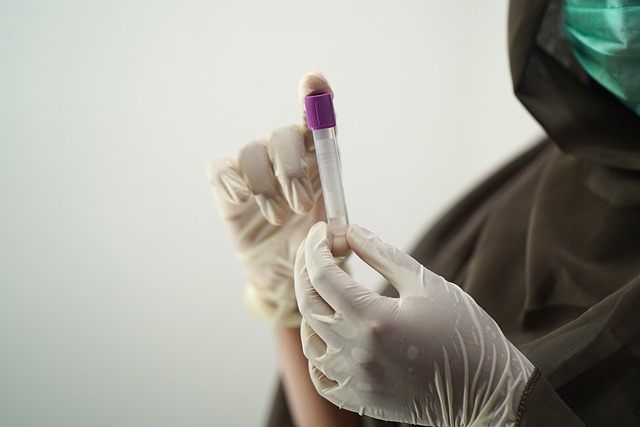This section underscores the critical role of Vitamin B12 and hormone analysis in diagnosing and managing reproductive health issues. A Vitamin B12 blood test UK is a vital tool for assessing B12 status, which is essential for cell division, DNA synthesis, and preventing anemia, all of which impact fertility and ovulation. The NHS offers this test at no cost, ensuring accessibility for residents. Hormones like FSH, LH, estrogen, and progesterone are pivotal in regulating the menstrual cycle and can indicate fertility status or potential disorders such as PCOS or thyroid issues. Regular testing and maintaining optimal B12 levels through diet or supplementation are crucial for endocrine system health and hormonal balance, supporting conception and a healthy pregnancy. For individuals with reproductive concerns, early diagnosis through a Vitamin B12 blood test can lead to personalized treatment plans that may include hormone replacement therapy or lifestyle changes to improve overall reproductive well-being. Regular monitoring and addressing any imbalances promptly are key for optimizing reproductive health outcomes in the UK.
Navigating reproductive health concerns can be a complex journey, often requiring a deep understanding of hormonal balances and their interplay with nutrition. A pivotal aspect of this journey is the role of reproductive hormones and Vitamin B12 in maintaining fertility health. This article delves into the critical importance of Vitamin B12, as highlighted by its specific relevance to reproductive well-being, particularly through a Vitamin B12 Blood Test UK. We will explore how this test can serve as an informative tool for diagnosis and treatment, guiding individuals towards effective lifestyle adjustments and hormone imbalance management. Understanding these components is essential for anyone facing reproductive issues, offering a clear path to better health outcomes.
- Understanding Hormone Analysis: The Role of Reproductive Hormones and Vitamin B12 in Fertility Health
- The Importance of Vitamin B12 Blood Test UK for Reproductive Well-being: A Comprehensive Guide
- Navigating Hormone Imbalances: Diagnosis, Treatment, and Lifestyle Adjustments for Reproductive Issues
Understanding Hormone Analysis: The Role of Reproductive Hormones and Vitamin B12 in Fertility Health

Understanding hormone analysis is pivotal for addressing reproductive issues, particularly when it comes to the role of reproductive hormones and Vitamin B12 in fertility health. Reproductive hormones such as follicle-stimulating hormone (FSH), luteinizing hormone (LH), estrogen, and progesterone play a critical part in the menstrual cycle. Their levels are indicative of ovulation and overall reproductive health. Consequently, hormone analysis involving blood tests can offer insights into potential fertility challenges by measuring these hormones’ levels accurately. For instance, an imbalance or deviation from the normal range can signal issues like polycystic ovary syndrome (PCOS), thyroid disorders, or premature ovarian insufficiency.
Vitamin B12, a key nutrient for overall health, also has a significant impact on fertility. A Vitamin B12 blood test UK is a standard procedure to determine an individual’s B12 levels. This vitamin is essential for DNA synthesis and the production of red blood cells. Low levels of B12 can lead to anemia, which may affect ovulation and implantation processes. Therefore, ensuring adequate Vitamin B12 intake through diet or supplementation is important for both male and female reproductive health. Adequate B12 levels contribute to the proper functioning of the endocrine system, thereby influencing hormone production and regulation, which are vital for conception and maintaining a healthy pregnancy.
The Importance of Vitamin B12 Blood Test UK for Reproductive Well-being: A Comprehensive Guide

Understanding the role of vitamins in overall health, particularly for individuals facing reproductive issues, is crucial. Vitamin B12, a vital nutrient, plays a significant role in cell division and DNA synthesis, processes that are fundamental to fertility. A deficiency in B12 can lead to a host of reproductive health complications, including altered menstrual cycles, reduced sperm counts, and an increased risk of miscarriages. Consequently, for those in the UK grappling with such issues, opting for a Vitamin B12 blood test is a prudent step towards diagnosing and addressing potential deficiencies. This test measures the level of B12 in the bloodstream, which can then inform treatment plans aimed at optimizing reproductive health outcomes. It’s imperative to recognize that the UK’s National Health Service (NHS) provides access to this test, making it a readily available tool for individuals seeking to understand their reproductive well-being better. Additionally, beyond the scope of the NHS, private healthcare options also offer Vitamin B12 blood tests with rapid results, catering to those who prefer expedited service or additional privacy. Regardless of the chosen route, regular monitoring and maintenance of optimal B12 levels can significantly contribute to improved reproductive health, underscoring the importance of this test for anyone experiencing reproductive difficulties in the UK.
Navigating Hormone Imbalances: Diagnosis, Treatment, and Lifestyle Adjustments for Reproductive Issues

Navigating hormone imbalances is a critical aspect of addressing reproductive issues. The first step in this journey involves accurate diagnosis, which often begins with a Vitamin B12 Blood Test UK due to its role in regulating hormonal health and overall well-being. This test measures the levels of Vitamin B12 in the bloodstream, as deficiencies can significantly impact reproductive function and fertility. If imbalances are detected, healthcare providers may recommend a range of treatments tailored to the individual’s specific needs. These treatments can include hormone replacement therapy (HRT), medication to regulate hormone production, or lifestyle adjustments aimed at optimizing endocrine health. For instance, dietary changes to incorporate more B12-rich foods like fish, meat, and fortified cereals can be beneficial. Additionally, managing stress through mindfulness practices, regular exercise, and adequate sleep are also crucial in supporting hormonal balance. In conjunction with medical interventions, these lifestyle modifications can play a pivotal role in improving reproductive health outcomes and addressing the underlying causes of hormone imbalances. It’s important for individuals to work closely with their healthcare providers to develop a comprehensive plan that considers both medical treatments and holistic approaches, ensuring a personalized and effective approach to managing reproductive issues related to hormone imbalances.
In conclusion, hormone analysis plays a pivotal role in addressing reproductive issues, with insights into reproductive hormones and Vitamin B12 levels being particularly informative for maintaining fertility health. The Vitamin B12 Blood Test UK stands out as an essential diagnostic tool, offering clear guidance on the nutritional status affecting reproductive well-being. By understanding the intricacies of hormonal balances, healthcare providers can tailor effective treatments and lifestyle adjustments to overcome reproductive challenges. This comprehensive analysis underscores the importance of integrating such tests into routine fertility assessments, paving the way for improved outcomes in reproductive health management.
